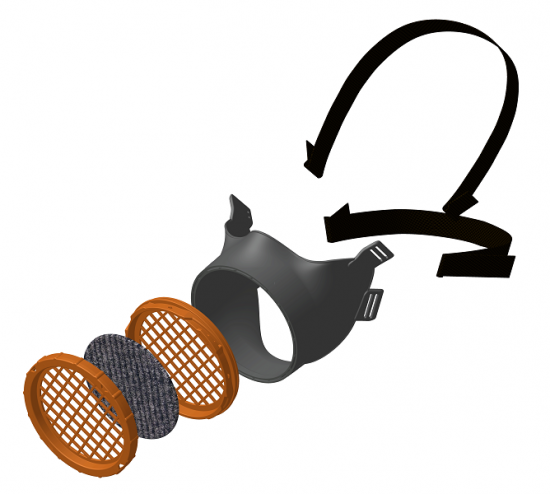Michelin contributes to French face mask project
 Michelin says the OCOV mask is affordable, sustainable and can be produced in large quantities
Michelin says the OCOV mask is affordable, sustainable and can be produced in large quantities
Michelin has been working with other companies to produce a new type of reusable face mask for use in the COVID-19 pandemic. The tyre maker adds that this OCOV mask, developed within a matter of weeks, is affordable, sustainable and can be produced in large quantities.
The OCOV mask was entirely developed in the Auvergne-Rhône-Alpes region – which includes Michelin’s hometown of Clermont-Ferrand. A ‘collaborative ecosystem’ of large companies such as Michelin, as well as local authorities and medical specialists, was set up on 16 March to work on the design and large-scale rollout of a reusable mask.
Production will also take place within the region.
As opposed to an FFP1 or FFP2 face filter, made solely of filtering material, the OCOV is an FMP1 or FMP2 face mask featuring a flexible facepiece covering the nose, mouth and chin, as well as replaceable and reusable filters. The leakage rate authorised by the FM standard is five times less than that specified for the FF standard (FM: <2% / FF: <8%). The OCOV’s flexible facepiece ensures a snug fit, thereby minimising leakage compared to FFP1 and FFP2 filters or other washable masks. It provides a good seal between the atmosphere and the wearer’s face (whether the skin is dry or moist and when the head moves). Particularly comfortable for extended periods of time, it can be reused up to 100 times thanks to five washable, interchangeable2 filters, while its production cost is very competitive.
For the purposes of this project, France’s Grenoble-based Atomic Energy Commission (CEA) based is providing access to its infrastructure and research/testing resources. Leveraging their know-how to very rapidly produce the first prototype, Michelin and CEA teams quickly mobilised alongside other regional industrial partners. This speed of response allowed mask production operations to begin in less than three weeks. Ouvry, a Lyon-based SME specialising in biological and chemical personal protective equipment, was chosen to manufacture and market the mask.
Production of a prototype batch of 5,000 units is currently underway. The goal is to produce one million masks per week by May, leading to total production of more than five million masks by end-June (equivalent to 500 million current single-use masks). Some 130,000 masks have already been reserved, a portion of which will be given to regional health agencies by Michelin.




Comments